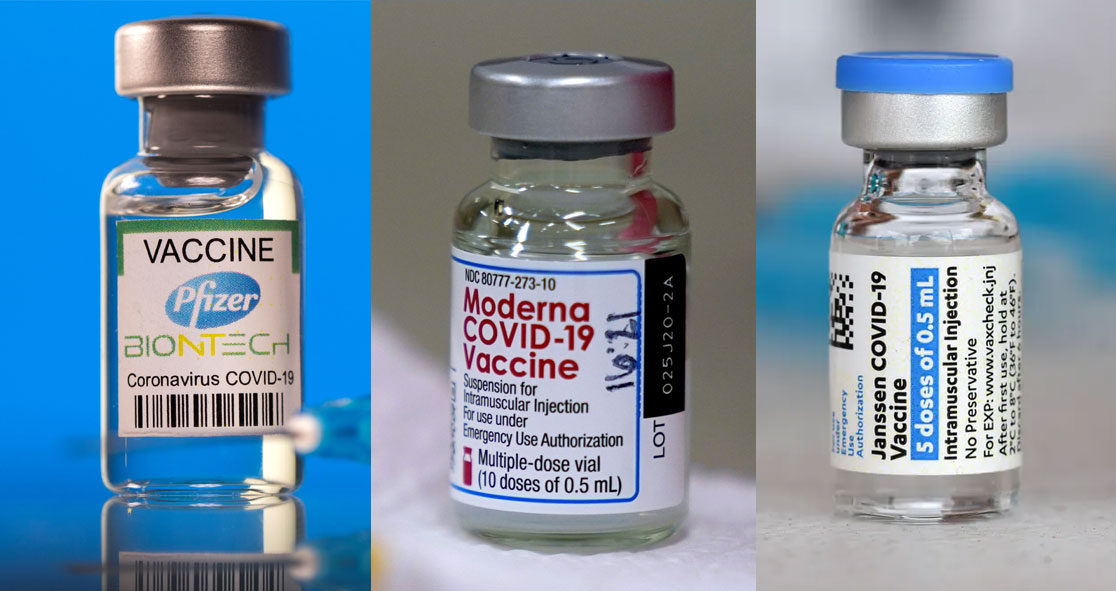SARS-CoV-2, the virus that causes COVID-19, has significantly affected the whole world, killing more than 4.5 million people so far.
The U.S. Food and Drug Administration (FDA) has recently announced full approval of the Pfizer-BioNTech vaccine and issued the Emergency Use Authorization (EUA) of Moderna and Johnson & Johnson (J&J) vaccines to help protect against COVID-19.
The FDA issued EUA to Pfizer vaccine on December 11, 2020; however, the agency announced full approval of the vaccine last week. Moderna received EUA on December 18, 2020, while J&J received it on February 27, 2021.
So, what is the difference between these three vaccines?
For starters, Pfizer and Moderna are messenger RNA (mRNA) based vaccines, while J&J is an adenovirus vector-based vaccine.
A vaccine based on mRNA teaches the immune system to prevent infection from the coronavirus, and an adenovirus vector-based vaccine teaches the immune system to attack the protein that causes the virus to infect other cells, according to Healthline.
Dosages
Pfizer and Moderna vaccines are given in two doses, with a gap of 21 and 28 days between the doses, respectively. J&J vaccine is administered as a single dose. A person is considered fully vaccinated two weeks after they receive their second dose of either Pfizer or Moderna vaccine or the single-dose J&J vaccine.
Efficacy
Vaccine efficacy is the percentage of protection against COVID-19 in people who are vaccinated compared to those who are not. Efficacy plays a key role in clinical trials, which helps the FDA to review a particular vaccine and decide whether to grant EUA.
Overall, Pfizer’s efficacy was found to be 95% seven days after receiving the second dose; Moderna’s efficacy was more than 94%; J&J’s over efficacy was 66%. However, J&J vaccine efficacy varied among nations; for instance, it was over 74% in the U.S., 66.2% in Brazil, and 52% in South Africa.
As far as the eligibility is concerned, Pfizer has been approved for people aged 12 and above and Moderna and J&J for individuals aged 18 and above.
Boosters
Currently, the FDA has approved a third (booster) dose of Pfizer COVID vaccine for immunocompromised, which means people who have a weak immune system, cancer, HIV, etc.
In mid-August, the Biden administration announced that a booster dose of COVID-19 vaccines would likely start in September. And people who received the Pfizer and Moderna vaccines would be eligible to get a booster shot eight months after they received their second dose of the vaccines.
Which vaccine is the best?
The U.S. Centers for Disease Control and Prevention (CDC) currently does not recommend one vaccine over another. In general, it says it is important to get a vaccine that is the earliest one available to you.
Although the J&J vaccine efficacy seems lower than the Pfizer and Moderna vaccines, the J&J vaccine still provides enough protection after just one dose.
What the FDA says? It says it is actually not possible to directly compare these three vaccines because the clinical trials for these vaccines all had differences in the study protocol and endpoints, geographic locations, study participants, and the time in the pandemic during which they were carried out, according to Healthline.
Nevertheless, taking the results of the large-scale clinical trials into consideration, all three vaccines have been proven to be safe and effective.
Experts say getting vaccinated immediately will help protect you from the deadly coronavirus and slow the spread of the virus in the community. Seek professional advice if you have any concerns about vaccines or their side effects.























